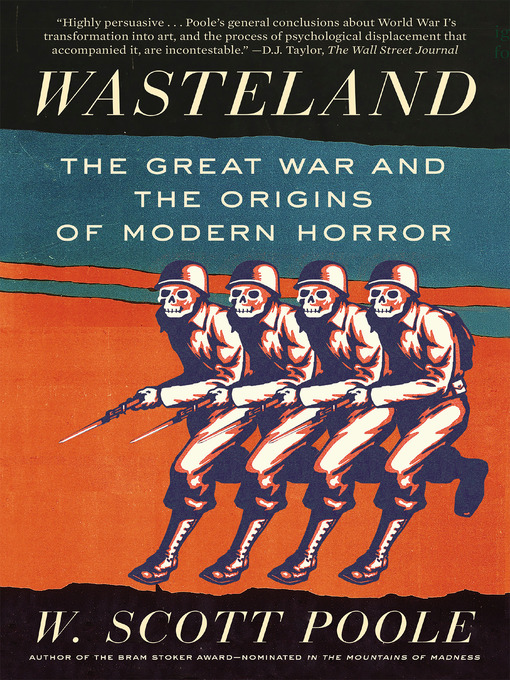From Nosferatu to Frankenstein’s monster, from Fritz Lang to James Whale, the touchstones of horror can all trace their roots to the bloodshed of the First World War.
Bram Stoker Award nominee W. Scott Poole traces the confluence of military history, technology, and art in the wake of World War I to show how overwhelming carnage gave birth to a wholly new art form: modern horror films and literature.
-
Creators
-
Publisher
-
Release date
October 16, 2018 -
Formats
-
Kindle Book
-
OverDrive Read
- ISBN: 9781619022881
-
EPUB ebook
- ISBN: 9781619022881
- File size: 1508 KB
-
-
Languages
- English
-
Reviews
-
Kirkus
September 1, 2018
Poole (History/Coll. of Charleston; In the Mountains of Madness: The Life and Extraordinary Afterlife of H.P. Lovecraft, 2016, etc.) brings a scholar's eye and a devotee's heart to a study of the literary, film, and artistic incarnations of horror from the World War I period to today.This is really two books, one an excellent examination of the nightmare repercussions of the Great War and a second that is only partially successful in tying it to the origins of horror as entertainment--and catharsis. Tales of the macabre existed long before the war, but the author argues that the war remains the true wellspring of the modern genre. His evidence makes a persuasive case, up to a point. The book is obviously the result of significant research, but Poole spends too much time playing amateur psychologist in an effort to support his premise, frequently interpreting the facts to fit his conjectures. The author's command of literary and film studies is evident, and he takes care to examine a wide range of noted works and their creators rather than just the standard-bearers. But he also undercuts his arguments through overstatement--e.g., claiming that the recent rash of zombie films and TV is "a national obsession." An astute exploration of the cultural significance of a film like Nosferatu is one thing, but some readers may have a hard time taking seriously the claim that an orgy of ooze like the dreadful 1982 remake of The Thing is a "classic." This is not a matter of being dismissive of genre works, which can be superb, or of the author, who is clearly a sharp, talented historian.A mixed bag studded with insights and flaws. Poole, who tends to conflate his personal tastes with high art, fires pre-emptive strikes against critics dismissive of the horror genre, but he fails to accept the legitimate reasons why these judgments hold sway.COPYRIGHT(2018) Kirkus Reviews, ALL RIGHTS RESERVED.
-
Publisher's Weekly
Starred review from July 2, 2018
In this thoroughly engrossing cultural study, Poole (In the Mountains of Madness), a history professor at the College of Charleston, persuasively argues that the birth of horror as a genre is rooted in the unprecedented destruction and carnage of WWI. Filmmakers and artists, many of them veterans, he proposes, saw in horror imagery a way to critique war, and thereby “transformed fantasy into a simulacrum of reality.” Poole locates glimpses of the war’s horrors in work produced during and soon after it—not only explicit references, as in the trench warfare art of Otto Dix and the war dead rising at the end of Abel Gance’s film J’Accuse, but in more subliminal images: the technologized tools of killing in Kafka’s story “In the Penal Colony”; the somnambulist who unthinkingly obeys an authoritarian master in the film The Cabinet of Dr. Caligari; images of body dismemberment in Freud’s essay The Uncanny. Although some may feel that Poole overstates the proliferation of war horror images in the arts, his extensive and well-supported citations will make it hard for readers who haven’t considered the wartime context for horror’s emergence to forget it. Agent: Deirdre Mullane, Mullane Literary.
-
Formats
- Kindle Book
- OverDrive Read
- EPUB ebook
Languages
- English
Loading
Why is availability limited?
×Availability can change throughout the month based on the library's budget. You can still place a hold on the title, and your hold will be automatically filled as soon as the title is available again.
The Kindle Book format for this title is not supported on:
×Read-along ebook
×The OverDrive Read format of this ebook has professional narration that plays while you read in your browser. Learn more here.


